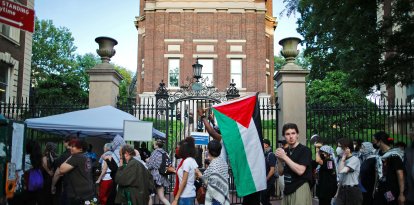No to anti-Semitism! Caffe Aronne, a story of hope
The supportive community in the face of the organized mob makes sense of the phrase that the cafe's owner, Aaron Dahan, said: "Evil always loses."

(Cordon Press)
When Aaron Dahan started his small catering business just five years ago, he never thought he would become the protagonist of one of those novel stories, a mix of tragedy and hope, that would end up making him famous. The young man, who started with very little, quickly expanded his company until he had a small chain of coffee shops, first a location in the West Village and then another on the Upper East Side in New York City. Precisely, the coffee chain that he called Caffe Aronne, became the epicenter of a moving story after the surprising resignation of employees, offended by Dahan's public support for Israel, following the October 7 attack.
When the conflict broke out, and in line with company rules, Dahan tried to ensure that his workplace remained free of politics, but found this impossible. As has happened to many people, the war showed him that not all people were tolerant, respectful and as ethical as he thought. He immediately suffered the division that until a few weeks ago, remained latent. It so happened that among those killed by the Hamas attack were his cousin and his wife, who were at the Nova music festival, one of the places where the massacre was perpetrated. At first, since they were missing, Dahan and his family believed they were among the hostages, and he wanted to raise awareness about the tragedy, placing posters with the faces of the kidnapped people on his cash register and on shop windows. News soon arrived that their relatives had been murdered and that their bodies were so mutilated that it had taken eight days to identify them.
In tribute to them and in support of Israel, a small Israeli flag was placed next to the American flag in their cafes. The business had already done something similar by placing a Ukrainian flag after it was invaded by Russia. At the same time he started a fundraiser, where customers could donate to Magen David Adom, the Israeli Red Cross. Immediately an employee quit because of that small Israeli flag and the collection. The next day, another employee told him:
Dahan's response was to propose a dinner for the team. He wanted to tell his story and provide information that would help employees understand. He wanted to tell them that his grandmother was born in Israel in 1941, when it was still a British mandate. That his grandfather was expelled from Afghanistan for being Jewish and that in Israel, he found his home in a kibbutz. He wanted to tell them about when he himself studied in Israel and thought that, if he explained the growth of the Palestinian population, the composition of Israeli institutions and other key data, it would no longer be easy for them to use words like apartheid or genocide. He thought that his employees were simply unaware of what was happening and considered that, since they were all university students, intelligent and educated, he would get them to stop accusing him of these acts. However, that staff dinner never happened and things started to get increasingly awkward.
Despite the rule against discussing politics with customers, one employee expressed support for Hamas to a diner. A couple of days later, two of their baristas showed up at the Caffe Aronne branch on Lexington Avenue and 71st Street, wearing pro-Palestinian badges on their aprons, sparking a dispute with the manager. Then the employees sent a text message telling him they were quitting. Then another employee took issue with the company's no-politics policy. From then on, everything snowballed and the place was left without staff.
Dahan was attending a private event and couldn't be in the cafe. Dejected, he called his mother, Peggy, and asked her to close the place. But the woman decided to keep the doors open, committed to tending the cafe herself and called friends to join her. "I just got here and I didn't know how to use the cash register, but I learned how to make a cold brew and use the espresso machines," Peggy Dahan told her friends. A customer noticed that Peggy was not dressed in the place's apron, nor did she know how to serve properly, and asked what was happening. Dahan's mother told him what happened. The man put the story on the networks and it went viral. Many began to approach, the owner of the Coffee Inn went to help and the manager of Matto, an Israeli franchise with nearby locations, told him: "My cups are your cups, my beans are your beans and my team is your team." Soon, more friends, and friends of friends, came forward to lend support.
The news spread so successfully in the neighborhood that Dahan's cafe, with capacity for only a dozen people, was packed. A family friend must have helped organize the journalists who had gone out to cover the story. Dahan couldn't believe what was happening, it became a sensation and several teams of journalists with cameras set up shop inside, beyond the counter, to report the phenomenon. Customers did not stop arriving in droves and waited patiently, because there was a line that permanently stretched for blocks.
Many of the customers contributed to the cafe's fundraiser, which aimed to buy doctors a vehicle used to quickly respond to emergencies, and were now hoping to buy two of them. Despite the violent anti-Semitic demonstrations and actions that are occurring in several cities around the world, including New York, Dahan told the media that he is not worried about the threats because he felt protected by his community. The story of Caffe Aronne is similar to that of other restaurants that have seen an increase in sales, despite the threats they were facing due to their support for Israel. On Long Island, a Greek restaurant called Golden Dolphin Diner also suffered boycotts and threats, but in turn received overwhelming support from the community. "I can't change the world. What I can do is make people understand that there are people who are still missing," said owner Peter Tsadalis. Customers support the bravery, and there too appeals on social media have generated an avalanche of new customers.
There have been many expressions of anti-Semitism in New York and throughout the United States. There are many organizations that are coordinating and calling for the targeting of businesses owned by Jews or whose owners support the State of Israel. Violent actions such as the release of rodents, the vandalization of shop windows and threats to employees are becoming more and more frequent in the news. But the story of Caffe Aronne and its owner, Aaron Dahan, is possibly a light among so much darkness. The community of solidarity in the face of the organized mob makes sense of the phrase that young Dahan said in an interview: "Evil always loses."
RECOMMENDATION





















